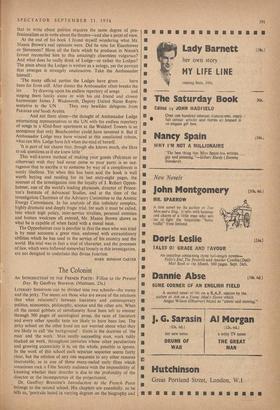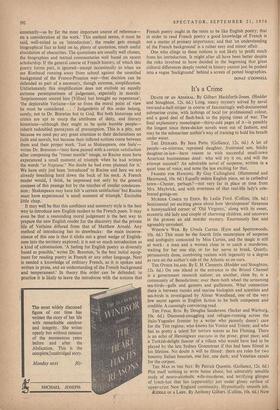The Colonist
LITERARY historians can be divided into two schools—the messy and the jerky. The messy are those who are aware of the relations (but what relations?) between literature and contemporary politics, economics, philosophy, science and the other arts. When all the casual gobbets of simultaneity have been left to simmer through 500 pages of sociological prose, the taste of literature and every other specific taste are likely to have been lost. The jerky school on the other hand are not worried about what they are likely to call 'the background': theirs is the doctrine of 'the man' and 'the work.' Man neatly succeeding man, work tidily stacked on work, throughout centuries whose other peculiarities and growing eccentricity it is, on the whole, possible to ignore. In the work of this school each separate sequence seems fairly clear, but the relation of any one sequence to any other remains inscrutable; as in one of those many-reeled early films which sometimes rack a Film Society audience with the impossibility of knowing whether their disorder is due to the profundity of the director or the incompetence of the projectionist.
Dr. Geoffrey Brereton's Introduction to the French Poets belongs to the second school. His chapters are essentially, as he tells us, 'portraits based in varying degrees on the biography and constantly—as by far the most important source of reference— on a consideration of the work.' This method seems, it must be said, well-suited to an `introduction'; the reader gets enough biographical fact to hold on to, plenty of quotation, much useful elucidation of obscurities. The quotations are usually well chosen, the biographies and textual commentaries well based on recent scholarship. If the general course of French history, of which this poetry forms part, is ignored—except occasionally as when we see Rimbaud running away from school against the unsettled background of the Franco-Prussian war—that 'decision can be defended as part of a necessary, though extreme, simplification. Unfortunately this simplification does not exclude an equally extreme peremptoriness of judgement, especially in morals : `Imprisonment soured him [Villon] but brought no repentence'; `the deplorable Verlaine—for so from the moral point of view he must be considered. . . .' Judgements of this order belong, surely, not to Dr. Brereton but to God. But both historians and critics are apt to usurp the attributes of deity, and literary historians—although they ought to be quite humble people— inherit redoubled paroxysms of presumption. This is a pity, not because we need pay any great attention to their declarations on faith and morals, but because their inflated notions come between them and their proper work. 'Just as Shakespeare, one feels'— writes Dr. Brereton—`may have paused with a certain satisfaction after composing the "russet mantle" image, so Racine must have experienced a small moment of triumph when he had written the words "et Neptune." No doubt he had even planned for it.' We have only just been 'introduced' to Racine and here we are already breathing hard down the back of his neck. A French reader would, I think, be impressed not only by the general cosiness of this passage but by the touches of insular condescen- sion: Shakespeare may have felt 'a certain satisfaction' but Racine must have experienced 'a small moment of triumph.' Excitable little chap.
It may well be that this confident and summary style is the best way to introduce new English readers to the French poets. It may even be that a resounding moral judgement is the best way to prepare the new English reader for the discovery that the private life of Verlaine differed from that of Matthew Arnold. Any method of introducing has its drawbacks: the main inconve- nience of this one is that it sticks out a great wedge of English- ness into the territory explored; it is not so much introduction as a kind of colonisation. 'A feeling for English poetry as diversely based as possible,' writes Dr. Brereton, 'is the best initial equip- ment for reading poetry in French or any other language. Next is needed a knowledge of ordinary French, as it is spoken and written in prose, and an understanding of the French background and temperament.' In theory this order can be defended; in practice it is likely to leave the introducee with the notions that
French poetry ought in the main to be like English poetry; that in order to read French poetry a good knowledge of French is not a matter of primary importance; and that 'an understanding of the French background' is a rather easy and minor affair.
One who clings to these notions is not likely to profit much from his introduction. It might after all have been better despite the risks involved to have decided in the beginning that great cultural differences deeply rooted in history cannot just be pushed into a vague 'background' behind a screen of potted biographies.
DONAT O'DONNELL



































 Previous page
Previous page